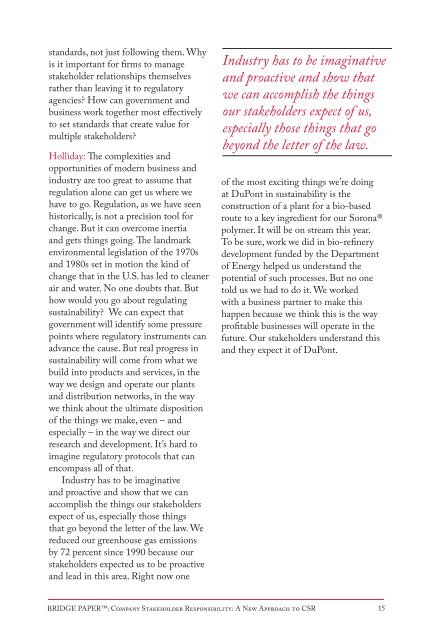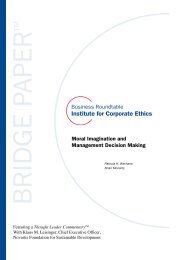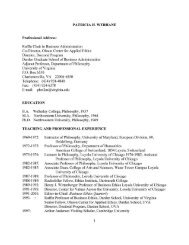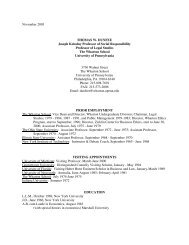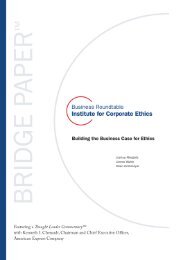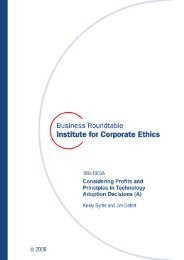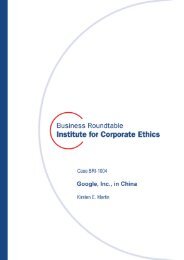A New Approach to CSR - Business Roundtable Institute for ...
A New Approach to CSR - Business Roundtable Institute for ...
A New Approach to CSR - Business Roundtable Institute for ...
You also want an ePaper? Increase the reach of your titles
YUMPU automatically turns print PDFs into web optimized ePapers that Google loves.
standards, not just following them. Why<br />
is it important <strong>for</strong> firms <strong>to</strong> manage<br />
stakeholder relationships themselves<br />
rather than leaving it <strong>to</strong> regula<strong>to</strong>ry<br />
agencies? How can government and<br />
business work <strong>to</strong>gether most effectively<br />
<strong>to</strong> set standards that create value <strong>for</strong><br />
multiple stakeholders?<br />
Holliday: The complexities and<br />
opportunities of modern business and<br />
industry are <strong>to</strong>o great <strong>to</strong> assume that<br />
regulation alone can get us where we<br />
have <strong>to</strong> go. Regulation, as we have seen<br />
his<strong>to</strong>rically, is not a precision <strong>to</strong>ol <strong>for</strong><br />
change. But it can overcome inertia<br />
and gets things going. The landmark<br />
environmental legislation of the 1970s<br />
and 1980s set in motion the kind of<br />
change that in the U.S. has led <strong>to</strong> cleaner<br />
air and water. No one doubts that. But<br />
how would you go about regulating<br />
sustainability? We can expect that<br />
government will identify some pressure<br />
points where regula<strong>to</strong>ry instruments can<br />
advance the cause. But real progress in<br />
sustainability will come from what we<br />
build in<strong>to</strong> products and services, in the<br />
way we design and operate our plants<br />
and distribution networks, in the way<br />
we think about the ultimate disposition<br />
of the things we make, even – and<br />
especially – in the way we direct our<br />
research and development. It’s hard <strong>to</strong><br />
imagine regula<strong>to</strong>ry pro<strong>to</strong>cols that can<br />
encompass all of that.<br />
Industry has <strong>to</strong> be imaginative<br />
and proactive and show that we can<br />
accomplish the things our stakeholders<br />
expect of us, especially those things<br />
that go beyond the letter of the law. We<br />
reduced our greenhouse gas emissions<br />
by 72 percent since 1990 because our<br />
stakeholders expected us <strong>to</strong> be proactive<br />
and lead in this area. Right now one<br />
Industry has <strong>to</strong> be imaginative<br />
and proactive and show that<br />
we can accomplish the things<br />
our stakeholders expect of us,<br />
especially those things that go<br />
beyond the letter of the law.<br />
of the most exciting things we’re doing<br />
at DuPont in sustainability is the<br />
construction of a plant <strong>for</strong> a bio-based<br />
route <strong>to</strong> a key ingredient <strong>for</strong> our Sorona®<br />
polymer. It will be on stream this year.<br />
To be sure, work we did in bio-refinery<br />
development funded by the Department<br />
of Energy helped us understand the<br />
potential of such processes. But no one<br />
<strong>to</strong>ld us we had <strong>to</strong> do it. We worked<br />
with a business partner <strong>to</strong> make this<br />
happen because we think this is the way<br />
profitable businesses will operate in the<br />
future. Our stakeholders understand this<br />
and they expect it of DuPont.<br />
BRIDGE PAPER: Company Stakeholder Responsibility: A <strong>New</strong> <strong>Approach</strong> <strong>to</strong> <strong>CSR</strong><br />
15


